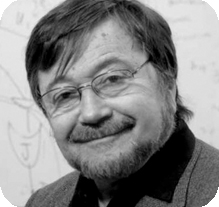ACM Fellows
USA - 2015
citation
For contributions to artificial intelligence through the development of a calculus for probabilistic and causal reasoning.
Press ReleaseACM A. M. Turing Award
USA - 2011
READ FULL CITATION AND ESSAYcitation
For fundamental contributions to artificial intelligence through the development of a calculus for probabilistic and causal reasoning.
ACM AAAI Allen Newell Award
USA - 2003
citation
For contributions to artificial intelligence and its applications, building a firm mathematical and theoretical foundation through ground-breaking work in heuristic search, reasoning under uncertainty, constraint processing, non-monotonic reasoning, and causal modeling.
Judea Pearl realized the overwhelming prevalence of uncertain information in real-world systems and developed a theoretical and algorithmic foundation for Artificial Intelligence based on probability theory. His influence outside AI has also been great. He forged links between computer science and statistics where none existed previously; his models are used to describe everything from the effects of diseases to the likely behavior of terrorists; and his ideas have revolutionized the understanding of causality in statistics, psychology, medicine, and the social sciences.
Pearl has made pioneering contributions in several areas:
- His 1984 book, Heuristics, tied together a broad array of work from several fields concerned with combinatorial problem solving and optimization. It contained much original work, including the use of formal tree models to analyze the relationship of search depth to decision quality; the first theorems relating the quality of heuristics and the complexity of search; and the discovery and analysis of admissible heuristics, which has led to marked improvements in the capability of modern planning software.
- His 1988 book, Probabilistic Reasoning in Intelligent Systems, has been influential in shaping both the theory and the practice of knowledge-based systems. Pearl's methods helped establish probabilistic networks for representing uncertainty in computer systems. His work demonstrated that networks of cause-effect relationships can represent the qualitative aspects of probabilistic knowledge and that most computations can be performed in a distributed fashion within the topology of these networks. The effects of Pearl's innovations are apparent in both academia and industry. His work is among the most cited in the computer science literature and is largely responsible for creating the field of Uncertainty in AI.
- His 2000 book, Causality: Models, Reasoning, and Inference, introduces causal networks, which refine the idea of Bayesian networks by modeling not just the uninterrupted operation of a stochastic system, but also the effects of all possible interventions. His contributions have had a major impact on the way causality is understood and measured in many scientific disciplines, most notably philosophy, psychology, statistics, econometrics, epidemiology, and social science. It is hard to identify a body of AI research that has been as influential on these related disciplines as has been Pearl's work on causality, culminating with his recent theories of causal discovery, counterfactuals, and interventions.

